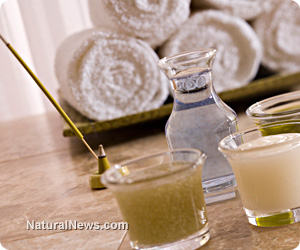
Tea tree oil is a mini medicine cabinet in a bottle
Saturday, October 12, 2013 by: Willow Tohi
Tags: tea tree oil, natural remedies, essential oils
- Newly released JFK files reveal Pentagon's role in creating Lyme disease and covid in the same lab
- Discovery of vast underground city beneath Giza pyramids challenges human history
- Black cumin seed oil emerges as a powerful ally against breast cancer and chronic inflammation
- Sugar-free deception: Artificial sweeteners hijack hunger signals, fuel obesity epidemic, study warns
- Kiss Your Genetic Privacy Good-Bye! 23andMe Gets Green Light to Sell Your Intimate Genetic Details to Anyone They Want
- Aluminum pollution: A silent threat to human health
- Dr. Suzanne Humphries makes bombshell appearance on Joe Rogan podcast, exposing vaccine industry deception back to POLIOMYELITIS
- Sweden's migrant crisis deepens as failed green energy venture leaves thousands jobless, exposes systemic collapse
- Is the vaccine-autism debate reopening? Washington Post sparks controversy with preemptive hit piece on David Geier
- Analysis: The coming economic collapse, a mass uprising and Trump's three secret weapons to halt the growing revolt
- A handful of pecans a day could keep heart disease at bay, study finds
- The mighty Eggplant: An underrated superfood with ancient roots
- Challenging the status quo: “America Fooled” by Timothy Scott exposes the myths about antidepressants
- The great crypto power struggle: How technocrats and governments are reshaping global finance
- RFK Jr. slashes HHS bureaucracy, saves taxpayers $1.8B while refocusing on chronic disease epidemic
- AI breakthrough slashes celiac disease diagnosis time from months to minutes
- Understanding the difference: “Food Allergies and Food Intolerance” by Dr. Jonathan Brostoff and Linda Gamlin
- HIGH-FAT FOOD DEPRESSION: Scientists discover why obesity takes away the pleasure of eating
- Newly released JFK files reveal Pentagon's role in creating Lyme disease and covid in the same lab
- Analysis: The coming economic collapse, a mass uprising and Trump's three secret weapons to halt the growing revolt
- Trump nominates VACCINE ZEALOT Susan Monarez to lead the CDC, sidelining RFK Jr.'s reform efforts
- Trump's greatest betrayal so far: Accelerating Middle East wars, silencing dissent, and serving Zionist masters
- Dr. Mike Yeadon releases 15-minute testimony - WATCH - about genocidal intent of COVID “vaccines”
- Festive flavors: The sweet history, nutritional profile and health benefits of pecan pie
- Elon Musk: Aliens could be here on Earth RIGHT NOW
- Big Pharma's $8 Billion bribery scheme exposed: how doctors are pushed to prescribe junk science, not heal
- 5 Simple steps to boost your brainpower: How to strengthen executive function in a distracted world
- Trump reverses course on Gaza plan, says “nobody is expelling Palestinians”
- A lack of integrity in Academia: Harvard professor found GUILTY of fraudulent research to promote CRT theory
- Reclaim your health: How midlife exercise reverses years of inactivity
- Survival 101: Effective EMF blocking techniques
- Florida takes a stand: DeSantis proposes permanent ban on mRNA vaccine mandates
- Sugarcane extract superior to cholesterol-lowering drugs?
- California's social media censorship law struck down: A victory for free speech or a threat to online safety?
- OpenAI whistleblower who dissented against how the company trained ChatGPT found dead
- EPA advisor admits the agency is funneling billions to climate groups ahead of Trump’s return to White House
- EPA advisor admits the agency is funneling billions to climate groups ahead of Trump’s return to White House
- Newly released JFK files reveal Pentagon's role in creating Lyme disease and covid in the same lab
- California's social media censorship law struck down: A victory for free speech or a threat to online safety?
- Dr. Mike Yeadon releases 15-minute testimony - WATCH - about genocidal intent of COVID “vaccines”
- The Health Ranger releases “Vaccine Zombie” song and music video, using AI-animated zombies for the music video
- The pandemic as a tool for INDOCTRINATION: Understanding “The Indoctrinated Brain” by Dr. Michael Nehls
- Florida takes a stand: DeSantis proposes permanent ban on mRNA vaccine mandates
- “Why we influenced the 2020 elections”: Facebook files reveal the coordinated effort to bury the Hunter Biden laptop story
- Mike Adams releases country western hit single: Goin’ Back in Time is Comin’ Home
- Mike Adams releases music poetry sensation: A Child of God
- Unpacking the Lies That We’ve Been Fed – new song and music video released by Mike Adams, the Health Ranger
- Michigan sheriff announces criminal investigation into 2020 election crimes, Dominion Voting Systems
- Migrants are taking advantage of recent hurricanes to scam residents and loot their homes
- House Intelligence Committee calls for the ARREST and PROSECUTION of Dr. Anthony Fauci
- RFK Jr. clears key hurdle: Sen. Susan Collins backs controversial HHS nominee, signaling a new era for health policy
- Rep. Nancy Mace introduces bill to ban biological males from female facilities on federal property
- Peter Rost exposes Big Pharma corruption in his book “The Whistleblower: Confessions of a Healthcare Hitman”
- Mike Adams releases new song and music video: Nothing More Disgusting Than a Globalist
- Red Cross issues warning to stop blood plasma donations from vaccinated people
- Scientists confirm: GENIUS brain function can be spontaneously unleashed in humans without any apparent cause
- EPA advisor admits the agency is funneling billions to climate groups ahead of Trump’s return to White House
- HYSSOP: What research reveals about the health benefits of this ancient holy herb
- Two containers with completed ballots fall out of truck in Florida
- Fully vaccinated about to see “tsunami” of illness and death, warns virologist
- Global leaders unite to clamp down on “misinformation” with UN-backed Cascais Declaration
- BREAKING: 2025 NDAA authorizes mandatory military draft of WOMEN across America… as Pentagon pursues global NUCLEAR war with both Russia and China at the same time
- Michael Yon warns of a ZIONIST TAKEOVER in Trump’s second administration
- BOMBSHELL: DNA testing kits are a SCAM to develop ethnic-specific bioweapons
- Ozempic and Wegovy weight loss drugs are injectable LIZARD VENOM PEPTIDES that may unleash a devastating wave of organ failure… side effects align with symptoms of SNAKE BITES
- Israeli soldiers accused of even more torture and abuse in the West Bank
- These 13 countries just signed an agreement to engineer a global FAMINE by destroying food supply
- NASA admits that climate change occurs because of changes in Earth’s solar orbit, and NOT because of SUVs and fossil fuels
- RFK Jr. clears key hurdle: Sen. Susan Collins backs controversial HHS nominee, signaling a new era for health policy
- Sermon 30: How Jesus reveals Caesar’s FAKE CURRENCY and FALSE AUTHORITY
- Coriander seeds: Ancient medicine backed by modern science
- Arizona officials claim Maricopa County needs 10-13 days to tabulate results of the election
Sometimes spelled Ti-Tree to avoid confusion with camellia thea, the tea bush that the black tea we drink comes from, tea tree comes from a completely different botanical family, called the Myrtaceae group, which includes niaouli, cajeput, clove, eucalyptus, and myrtle, all known for their anti-infectious action.
Tea tree's wide range of applications
The reason tea tree essential oil is useful in so many applications is because of its unusual ability to work effectively against all three categories of infectious organisms: bacteria, fungi, and viruses. Additionally, it increases the body's ability to respond to an attack by any organism because tea tree is a very powerful immune-stimulant. This is an astounding property that has incited much research as it seems effective at helping people with compromised immune systems, such as those with HIV. Tea tree is even used as a preventive, to build up the strength of patients before surgery. Candidates for surgery will use the oil in baths and massages for some weeks prior to their procedure, and after, avoiding the operation wound, to reduce post-operative shock.Tea tree is not generally found to be a skin irritant and can in fact be used in "neat," or undiluted, applications. People with sensitive skin should be cautious just in case, and start with a test patch. If sensitive, use a carrier oil or dilute. As few as three drops in a full bathtub has been shown to have the anti-infection properties described above for adults, so even if you do find neat applications uncomfortable, it is still quite useful.
Some tried and true uses for tea tree oil
Tea tree oil has been widely used for the following ailments:• Skin problems - Apply diluted oil to lesions to kill the bacteria that causes acne. Alternate with lavender. Dilute one or two drops in aloe vera gel for burns and sunburn, or other inflamed and sensitive areas, such as those with eczema or psoriasis. Add a couple drops to diaper cream to help kill diaper rash. Add tea tree oil to cloth diaper rinse water as a preventative measure.
• Fungal infections - Treat ringworm, athlete's foot, or nail infections with undiluted tea tree oil. Rub with cotton ball, or add drops to a moisturizer.
• Otitis - Use diluted tea tree oil in the ear for ear infection
• Insect bites - Place a drop of undiluted tea tree on all manner of insect bites, including spider bites and scorpion stings. Also works as insect repellent.
• Yeast infections - Mix in a salve or almond oil and use as an antiseptic. Mix five drops of tea tree oil in a half pint of water to make a vaginal douche to treat vaginal yeast infection, or other infections such as trichomoniasis, vaginitis, or cystitis. A study from the 1960s showed that 100 percent of the women with trichomoniasis treated with a tampon prepared with tea tree oil recovered fully.
• Outbreaks - Skin eruptions and viral outbreaks such as herpes and cold sores can be treated with undiluted tea tree applied topically. Warts should also be treated with full strength tea tree oil. Some people find it useful to mix it in a little alcohol, such as vodka. Treat shingles and chicken pox blisters this way as well.
• Dental infections - Use diluted tea tree oil to treat toothaches or thrush, and pyorrhea or other periodontal diseases. Five drops with three ounces of water, swish and gargle, keeping in your mouth in contact with the affected area for at least a minute, twice a day. Disinfect toothbrush by putting a couple drops on it. The gargle will also help a sore throat.
• Boils - Apply undiluted oil directly on cotton swab several times per day, disposing of carefully to avoid spreading the highly contagious infection. Also works on abscesses.
• Body odor - Add several drops to bath water to treat body odor and relax sore muscles
• Colds and flus - Use in the bath at first signs of cold or flu and it will induce profuse sweating, a valuable response to infection. If you catch it early enough it may stop the virus from developing. Otherwise, it will reduce its severity and duration, and help prevent secondary infections.
• Sinusitis, bronchitis, catarrh - Add several drops to hot water and breathe the steam. Place a towel over your head and the bowl of hot water to intensify. Alternately, place in burners or vaporizers.
• Seek out commercial products - There are a lot: lozenges, toothpastes, lotions, creams, etc.
Standard essential oil warnings apply: do not use internally, do not store near homeopathy remedies, do not use with homeopathy or flower essence protocols, check with a qualified practitioner if you have any serious and acute health challenges.
There are a lot of wonderful essential oils that have antiseptic properties, and that provide effective defense against bacteria and viruses, but anti-fungal oils are very few. Tea tree essential oil is an inexpensive, safe, versatile addition to any natural health medicine cabinet.
Sources for this article include:
https://www.naturalnews.com/033072_tea_tree_oil_remedies.html
Davis, Patricia. Aromatherapy: An A-Z. Barnes and Noble Books, New York 1995. P. 315-317.
Fischer-Rizzi, Susanne. Complete Aromatherapy Handbook. Sterling Publishing Co, New York 1990. p. 212.
Worwood, Valerie Ann. The Complete Book of Essential Oils & Aromatherapy. New World Library, San Rafael, CA, 1991. P. 20.
Tea tree oil at FETCH.news
Get independent news alerts on natural cures, food lab tests, cannabis medicine, science, robotics, drones, privacy and more.
Take Action: Support Natural News by linking to this article from your website
Permalink to this article:
Embed article link: (copy HTML code below):
Reprinting this article:
Non-commercial use OK, cite NaturalNews.com with clickable link.
Follow Natural News on Facebook, Twitter, Google Plus, and Pinterest
Science News & Studies
Medicine News and Information
Food News & Studies
Health News & Studies
Herbs News & Information
Pollution News & Studies
Cancer News & Studies
Climate News & Studies
Survival News & Information
Gear News & Information
News covering technology, stocks, hackers, and more



"Big Tech and mainstream media are constantly trying to silence the independent voices that dare to bring you the truth about toxic food ingredients, dangerous medications and the failed, fraudulent science of the profit-driven medical establishment.
Email is one of the best ways to make sure you stay informed, without the censorship of the tech giants (Google, Apple, Facebook, Twitter, YouTube, etc.). Stay informed and you'll even likely learn information that may help save your own life."
–The Health Ranger, Mike Adams













































